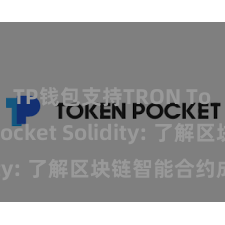TokenPocket Solidity: Understanding Blockchain Smart Contract Development With the rise of blockchain technology, smart contracts have become an integral part of decentralized applications (dApps). Solidity, a high-level language developed specifica...

TokenPocket Solidity: Understanding Blockchain Smart Contract Development
With the rise of blockchain technology, smart contracts have become an integral part of decentralized applications (dApps). Solidity, a high-level language developed specifically for writing smart contracts on the Ethereum blockchain, has gained popularity among developers for its ease of use and versatility. TokenPocket, a popular multi-chain wallet, has increasingly been used for developing and deploying smart contracts using Solidity.
Smart contracts are self-executing contracts with the terms of the agreement between buyer and seller directly written into lines of code. These contracts automatically verify, facilitate, and enforce the negotiation or performance of an agreement, providing a secure and transparent way of executing transactions without the need for intermediaries.
TokenPocket, as a user-friendly and secure wallet, offers developers a convenient platform to write, deploy, and manage smart contracts using Solidity. By integrating with various blockchains, including Ethereum, TRON, Binance Smart Chain, and more, TokenPocket provides a comprehensive solution for developers looking to create decentralized applications across multiple networks.
When it comes to Solidity, developers must first understand the basics of the language in order to effectively write smart contracts. Solidity is a statically-typed programming language designed for developing smart contracts on blockchain platforms. It is similar to JavaScript and C++, making it relatively easy for developers with prior programming experience to pick up.
To start writing smart contracts in Solidity, developers must first install an Integrated Development Environment (IDE) such as Remix or Visual Studio Code. These tools provide a user-friendly interface for writing, compiling, and debugging Solidity code. Once the code is written, developers can deploy their smart contracts to the blockchain using TokenPocket.
One of the most important aspects of any cryptocurrency wallet is its security features. The Bither Wallet employs a multi-signature technology that requires multiple private keys to authorize transactions. This makes it significantly more secure than traditional single-signature wallets, as even if one key is compromised, the funds remain safe. Additionally, Bither Wallet offers cold storage options for added security, keeping your assets offline and away from potential threats.
TokenPocket AppOne of the main advantages of the Bither Wallet is its ease of use. The wallet is designed to be user-friendly and intuitive, making it accessible to both experienced cryptocurrency users and newcomers to the digital asset space. Users can easily send and receive assets, track their portfolio, and view transaction history all from within the wallet's user interface.
TokenPocket provides a seamless deployment process for smart contracts, allowing developers to interact with the blockchain directly from the wallet interface. Developers can create custom tokens, execute complex financial transactions, and build decentralized apps with ease using TokenPocket’s Solidity integration.
In conclusion, TokenPocket Solidity offers developers a powerful tool for building decentralized applications and deploying smart contracts on various blockchains. By understanding the fundamentals of Solidity and leveraging TokenPocket’s user-friendly platform, developers can tap into the potential of blockchain technology to create innovative solutions for a wide range of industries.
OverallTP钱包支持TRON, TokenPocket Solidity provides developers with the tools and resources needed to unlock the full potential of blockchain technology and smart contract development. With its user-friendly interface and seamless integration with multiple blockchains, TokenPocket is empowering developers to build the next generation of decentralized applications.